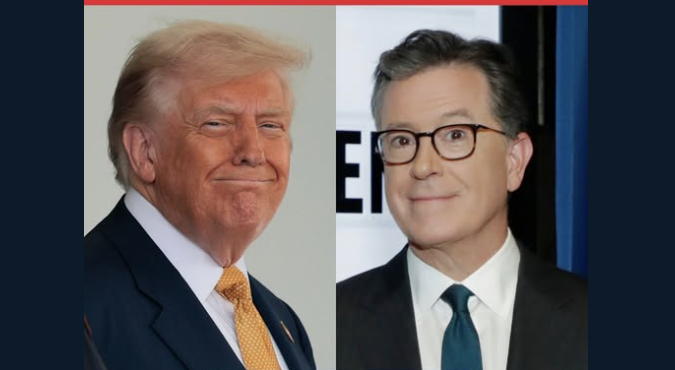Trump Celebrates Colbert’s Cancelation, Targets Kimmel Next: What It Really Means for Late-Night TV
In a move that has stunned the entertainment world, CBS announced that The Late Show with Stephen Colbert will be canceled in May 2026, ending a nearly 11-year run of sharp political satire and dominant ratings. Former President Donald Trump, long the subject of Colbert’s pointed commentary, responded swiftly—and predictably—by celebrating the news and taking aim at another prominent late-night critic: Jimmy Kimmel. The announcement, combined with a recent legal settlement between CBS’s parent company Paramount and Trump, has ignited a firestorm of political, cultural, and industry speculation.
Trump: “Love That Colbert Got Fired”
Trump posted gleefully on Truth Social following the cancellation news, writing:
“I absolutely love that Colbert got fired. His talent was even less than his ratings… I hear Jimmy Kimmel is next. Has even less talent than Colbert!”
This reaction aligns with Trump’s long-standing antagonism toward late-night hosts who have mocked or criticized him over the years. Stephen Colbert, in particular, was known for his satirical opening monologues targeting Trump’s policies, personality, and post-presidency legal troubles. Similarly, Jimmy Kimmel has frequently ridiculed Trump on his ABC show, often weaving pointed jokes into his nightly routines.
Trump’s post also praised Fox News’ Greg Gutfeld—who hosts the conservative-leaning Gutfeld!—and insulted Jimmy Fallon, calling him a “low-energy puppet.” The former president’s triumphant tone has only deepened concerns that the cancellation might be politically motivated or linked to recent corporate maneuvers.
A Shocking Decision: Colbert Was Winning in the Ratings
The announcement came as a shock, not just to fans but also to television insiders. The Late Show has consistently led late-night viewership since 2017, with recent numbers averaging around 2.42 million viewers per episode—beating out competitors like The Tonight Show with Jimmy Fallon and Jimmy Kimmel Live! in both total viewers and the crucial 25–54 demographic.
Colbert had also just returned from a brief summer break, and there had been no public indication that the show was struggling. In fact, it appeared to be thriving creatively and commercially. So why would CBS cancel a show that’s consistently topping its time slot?
CBS Cites Financial Concerns—But Timing Raises Eyebrows
CBS and its parent company, Paramount Global, have maintained that the decision is purely financial. In a statement, CBS said:
“As the media landscape evolves, we are making strategic adjustments to focus on sustainable, scalable content strategies that align with our long-term vision.”
However, this explanation hasn’t satisfied everyone. The cancellation came just days after Paramount settled a $16 million defamation lawsuit filed by Donald Trump—one that centered on The Late Show’s coverage of him. The proximity of the settlement and the cancellation has led to speculation that the network may have bowed to political or financial pressure.
Making things even more complex is Paramount’s ongoing merger with Skydance Media. The merger, which is still under regulatory review, could be influenced by perceived political alignments. Several Democratic lawmakers—including Senators Elizabeth Warren and Adam Schiff—have called for investigations into whether CBS executives were influenced by the Trump settlement or by fears of conservative backlash ahead of the merger.
Jimmy Kimmel Responds with Fury
Unsurprisingly, Jimmy Kimmel did not take the news or Trump’s commentary lightly. In an Instagram post that quickly went viral, Kimmel wrote:
“CBS, you spineless clowns. Firing Colbert is like firing a firefighter for getting too close to the flames. And Trump—worry about your indictments.”
The tone was one of defiance and disbelief, and Kimmel seemed to express solidarity with Colbert, whom he called “a fearless voice in a spineless time.” Despite Trump’s suggestion that Kimmel is “next,” there is currently no indication that ABC plans to cancel Jimmy Kimmel Live! The show remains a fixture of the network’s late-night lineup and maintains a strong, loyal audience.
Political Satire in Peril?
The cancellation of The Late Show raises broader concerns about the role of political satire in American media. Colbert, who originally gained fame as a faux-conservative host on Comedy Central’s The Colbert Report, brought a unique mix of wit, outrage, and authenticity to his CBS platform. For many viewers, especially during the Trump administration, his monologues served as a nightly form of resistance, humor, and catharsis.
In the current political climate, with Trump once again the Republican nominee and the 2024 election aftermath still reverberating, removing Colbert from the late-night landscape feels, to many, like silencing a dissenting voice. Critics of the cancellation argue that it sets a dangerous precedent: that satire and political criticism may be expendable when corporate deals or political pressure are involved.
Meanwhile, Trump’s apparent vendetta against late-night hosts reflects his broader disdain for media criticism. He has frequently labeled unfavorable coverage as “fake news” and has expressed interest in restricting press freedoms. His celebration of Colbert’s cancelation plays directly into that narrative.
A Turning Point for Late-Night TV
The Colbert cancellation also signals a shift in the late-night television model. In an era of streaming, fragmented audiences, and rising production costs, the traditional late-night format may be at a crossroads. While shows like Gutfeld! have found success with lower budgets and a conservative slant, legacy shows must now compete with YouTube, TikTok, and podcasts for younger viewers.
It’s worth noting that CBS will not replace The Late Show with another talk show in the same time slot. Instead, executives are reportedly exploring “alternative entertainment formats,” possibly including reality-based content or scripted programming. This pivot suggests that networks are reevaluating whether the late-night genre itself is sustainable in its current form.
What Comes Next?
As of now, The Late Show with Stephen Colbert is scheduled to run through May 2026, giving fans almost a full year of farewell programming. Colbert has not yet announced his next move, but few doubt he will remain a prominent voice in media or politics. Rumors already suggest interest from streaming giants such as Netflix and Apple TV+.
Meanwhile, Trump’s comments will continue to fuel the debate over whether the cancellation was about business, politics, or both. With Colbert’s departure and Kimmel under scrutiny, the question remains: is this the end of an era for political satire on mainstream TV?
Or is it just the beginning of a new battle between comedy and power?



